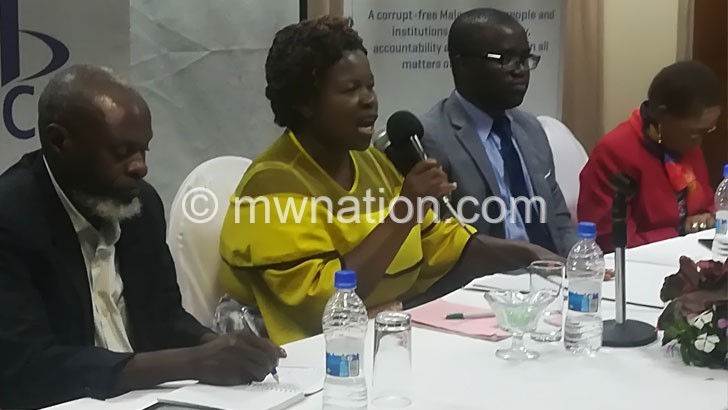ACB blames abuse on controlling officers
The Anti-Corruption Bureau (ACB) has accused controlling officers in government ministries, departments and agencies (MDAs) of allegedly abetting fraud and abuse due to their failure to implement audit recommendations to prevent loss of public resources.
Speaking during an anti-corruption debate jointly organised by Oxfam, Africa Institute of Corporate Citizenship (Aicc) and Integrity Platform in Mzuzu on Friday, ACB senior public relations officer EgritaNdala said failure by controlling officers to implement recommendations bothers the bureau.

During the debate held under the topic Auditor General’s Reports: Do They Really Matter in Fighting Abuse of Public Resources and Corruption?, most participants suggested the need for the Auditor General (AG) to be given prosecutorial powers.
But Ndala said while the National Audit Office (NAO) reports lack prosecutorial evidence, a laissez-faire attitude among controlling officers in the MDAs should change. She said even the citizenry should put authorities in check to safeguard the public purse.
She said: “It’s a bother to the ACB and to Malawians because what this shows is that the very people who are addressed in these reports, the controlling officers, are not taking the recommendations and implementing them.
“What is needed is just to follow the procedures like for procurement and financial management. ”
The ACB position comes in the wake of annual audit reports from NAO which outline a number of recurring issues in MDAs that lead to loss of resources.
Recurring issues include failure to submit documents for audit inspection, payments without supporting documents, failure to maintain a Fixed Asset Register, poor fuel management, poor stores management and unauthorised payments.
In an interview last evening, NAO spokesperson RabsonKagwamminga said the institution was delivering on its mandate to conduct audits and that the other issues remained with the affected institutions.
He said: “We are making an impact because most of the files at ACB are from us, and that tells you that we are working. Some people are actually afraid of indulging in corruption, not just for the fear of being arrested, but because of the fear of shame that people will know they are corrupt.”
In his contribution, socio-political commentator George Phiri of the University of Livingtonia, who was one of the panellists, suggested that controlling officers who fail to provide supporting documents for payments should be arrested.
He wondered how a local government council would make payments without supporting documents from the said purchases.
Anti-corruption law expert Wesley Mwafulirwa said Malawi needs evidence-based solutions.
He said: “Systems such as Maltis [Malawi Traffic Information System] and Ifmis [Integrated Financial Management and Information System] are just good, but are not properly used. For instance, only one component in the Ifmis is used, yet the system has over 10 components. Why not apply the rest?”
On his part, Integrity Platform coordinator Jeff Kabondo said discussions during the debate showed that the citizenry were tired of abuse of public resources and require an immediate end.
He said: “The public needs to participate in analysing these reports,
as we consider various options of improving our way of managing public resources and also fighting corruption in the country.”
A NAO report on the Compliance Audit of Local Councils for the year ending June 30 2018 details how councils disregard public finance management, showing how K7.4 billion cannot be accounted for in the 2017/18 fiscal year.
The report queried K5.29 billion in the year ending June 30 2017, and over K23 billion in the 2015/15 fiscal year, meaning over K35 billion has gone down the drain in three years.





